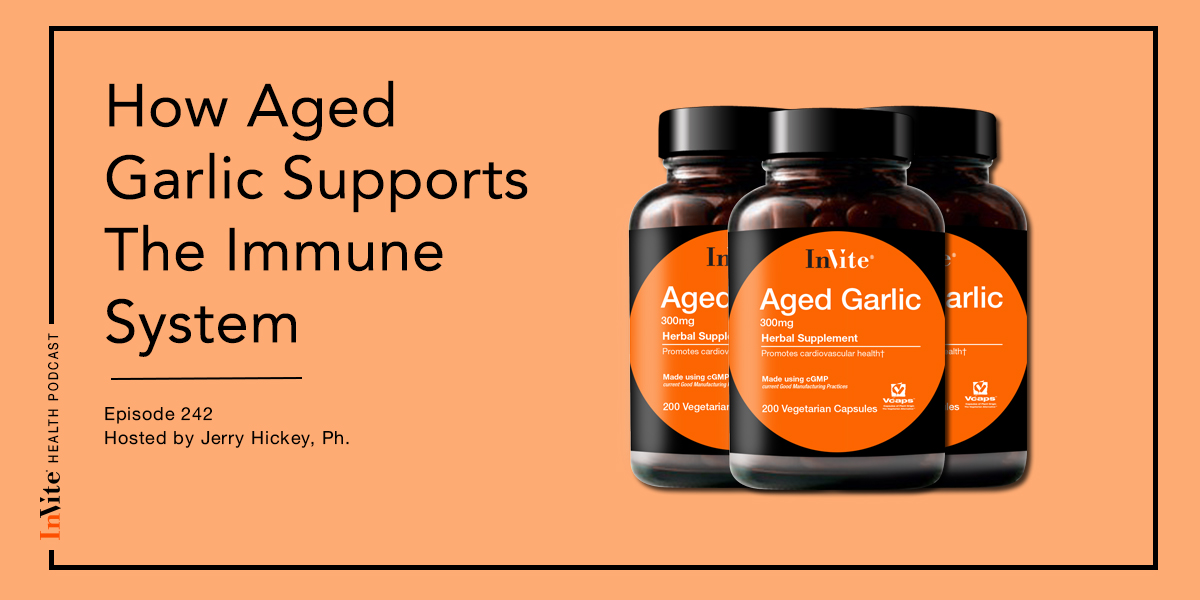aged garlic
Invite Health Podcast, Episode hosted by Jerry Hickey. Ph
Subscribe Today!
Garlic has many health benefits. Normally it’s used for cardiovascular health. That’s especially the aged garlic. The results with aged garlic are much more consistent for heart health and circulatory health. Normally, we’re recommending aged garlic for cardiovascular risk factors, for instance, the so-called bad cholesterol, which the body needs but can be harmful when levels get too high. Research is also indicating that aged garlic can help with triglycerides, which are made out of fats and sugars and prone to causing inflammation and damage in the organs and tissues. Today, we’re talking about aged garlic and the immune system.
Inflammation and immunity
When you look at the immune system, you have to look at it from various angles. One angle is you don’t want inflammation. A little bit of inflammation is necessary under controlled conditions. For instance, you need it to remodel tissues to get rid of dead, damaged and infected cells. You need inflammation, which is the primary weapon of the immune system, to kill viruses, bacteria and cancer cells. But when inflammation is consistent, which we call chronic long term inflammation, that becomes dangerous. It’s a major component of what damages your tissues. Many chronic diseases, including autoimmune conditions, brain diseases and arthritic conditions, have inflammation as a component.†
The Numerous Benefits of Aged Garlic – InVite Health Podcast, Episode 239. Listen Now >>
Learn more about the relationship between the immune system and inflammation by tuning into the full podcast episode.
You don’t want inflammation all the time. You just want it highly-focused and used when you need it. Aged garlic has been shown to help with that. You also want the immune system to be functioning well so that it takes out any viruses, bacteria, yeasts and parasites that are infectious. Garlic helps on both fronts.†

Here’s a study where they’re looking at the impacts of aged garlic on heart health. It’s an updated meta analysis. It’s from the National Institute of Integrative Medicine in Melbourne, Australia and was published in Nutrition, which is a very reliable journal. The first 20 human clinical trials they looked at were in 1000 people with high blood pressure. The aged garlic clearly reduced blood pressure in people with elevated blood pressure. It reduced the top figure by 9 points. That’s called systolic blood pressure, that’s when the heart is actively beating. It reduced the bottom figure, diastolic blood pressure, by 6 points on average. That’s very important. Diastolic blood pressure is when the heart is refilling with blood, so it’s getting a tiny rest. If that bottom number is elevated, it’s putting an awful lot of stress on the heart and it’s really connected with having a stroke or a mini-stroke.†
Supporting More Than Immunity With Mushrooms – InVite Health Podcast, Episode 225. Listen Now >>
They also looked at a meta analysis including studies on the immune system. There were almost 40 studies. Garlic has immunomodulating effects, which means that it helps benefit not only the function of the immune system when you need it, but also helping control it. That’s important. It increased macrophage activity. It increased natural killer cell activity. It improved the production of T cells and B cells. This is all very important, especially during the COVID-19 pandemic and cough, cold and flu season. The earliest parts of the immune system include macrophages. These are big, big cells that gobble up viruses and bacteria and destroy them. Natural killer cells are like the mid-part of the immune system. After the first wave of your immune system is floundering a little bit because it’s getting used up, your neutrophils, macrophages and dendritic cells are slowing down, and your natural killer cells step in. That’s really important because it takes about a week to make antibodies, so the natural killer cells bridge the gap between the earliest parts of the immune system and when you have T cells and antibodies attacking and killing the virus.†
Tune into the full podcast episode for additional research on the benefits of aged garlic.
Thank you for tuning in to the Invite Health Podcast. You can find all of our episodes for free wherever you listen to podcasts or by visiting www.invitehealth.com/podcast. Make sure you subscribe and leave us a review! Follow us on Facebook, Twitter and Instagram at Invite Health today. We’ll see you next time on another episode of the Invite Health Podcast.










